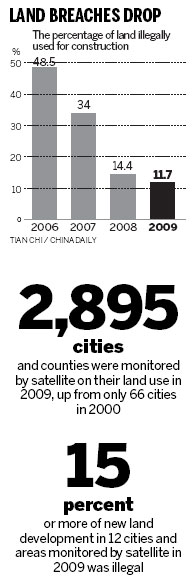-
News >Bizchina
Officials feeling pressure over illegal land use
2010-12-17 13:40BEIJING - Heads from 12 cities and regions with serious illegal land-use problems across China were invited to the Ministry of Land and Resources on Thursday for a face-to-face chat.

The purpose of the talks is to supervise local authorities and help them strengthen land protection measures, Xu Shaoshi, minister of land and resources, said on Thursday.
The 12 cities and regions include cities from Shanxi, Shaanxi, Heilongjiang, Yunnan, Hubei, Liaoning and Zhejiang provinces and the Guangxi Zhuang autonomous region, State broadcaster CCTV reported on Thursday.
In the 12 cities and areas, more than 15 percent of new land development is illegal - based on 2009 satellite images - and some of the land is used before official approval is received or is used during the process of approval, CCTV reported.
After face-to-face talks, those with severe illegal land-use problems will be punished and the amount of land approved for construction in 2011 will be decreased, Xinhua News Agency reported on Wednesday.
The invited officials were all taking the matter seriously and have talked about their further plans for illegal land control, Li Jianqin, director of the ministry's law enforcement and supervision department, told China National Radio on Thursday.
The final results will be released by the ministry, China National Radio reported, without mentioning the date.
This is the third time the country's land watchdog has asked local authorities with severe illegal land-use problems to talk face to face since 2008.
Scholars praised the ministry for targeting local authorities in cracking down on illegal land use.
Yan Jinming, a professor of land management at Renmin University of China in Beijing, told China Daily that local governments play a negative role in land conservation and it is right that the ministry is holding face-to-face talks with local authorities on illegal land use.The latest statistics from the ministry show the percentage of land used illegally for construction has decreased from 48.5 percent of new developments in 2006 to 11.7 percent in 2009.
The areas monitored by satellite have increased from 66 cities in 25 provinces and regions in 2000 to a total of 2,895 cities, regions and counties across the country in 2009.
Li Jianqin said satellite images can detect all illegal land use across the country and play an important role in the country's land protection.
